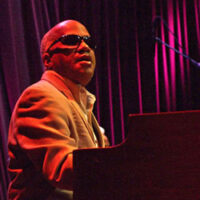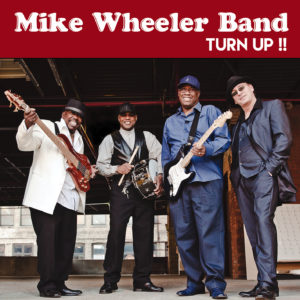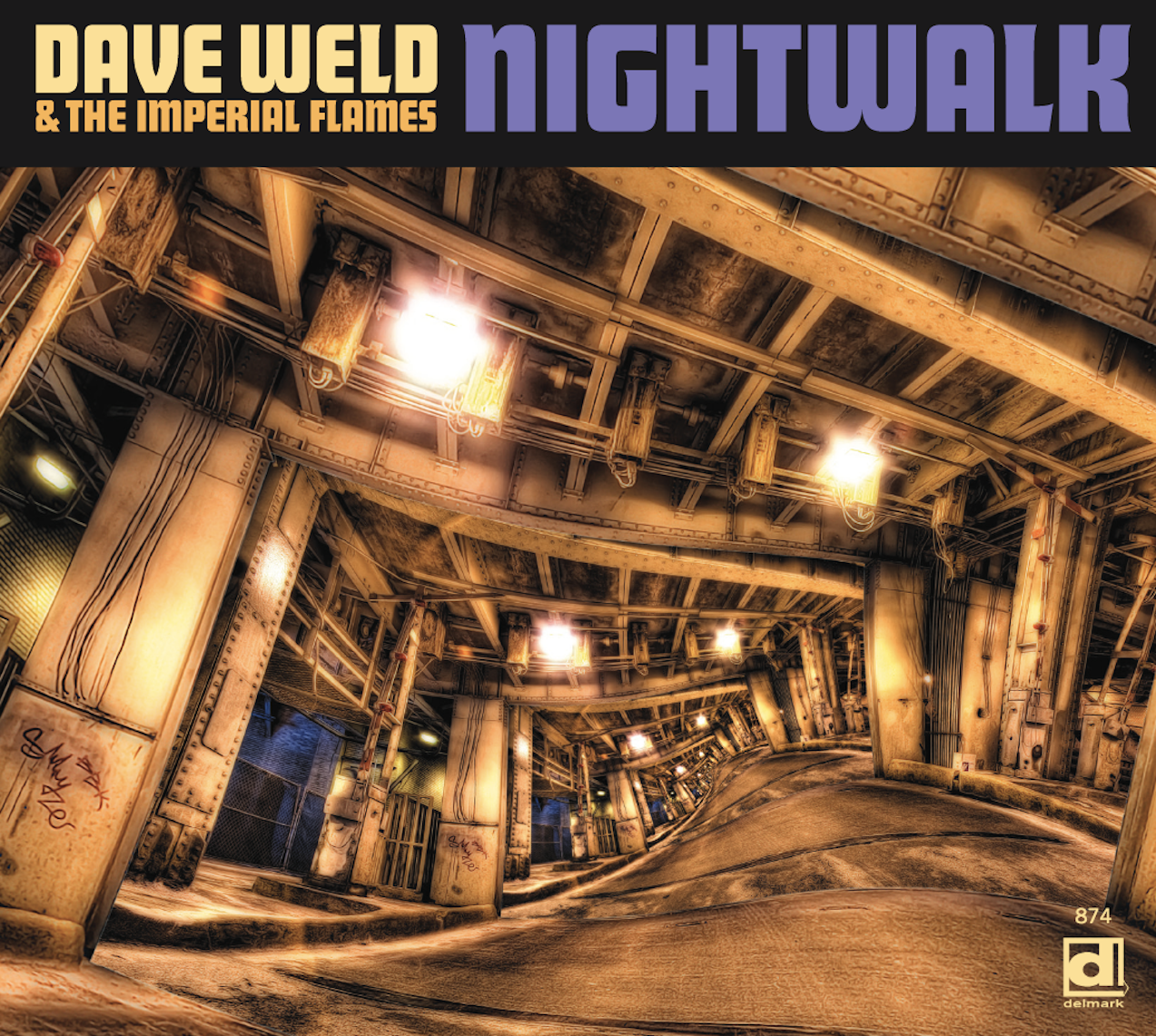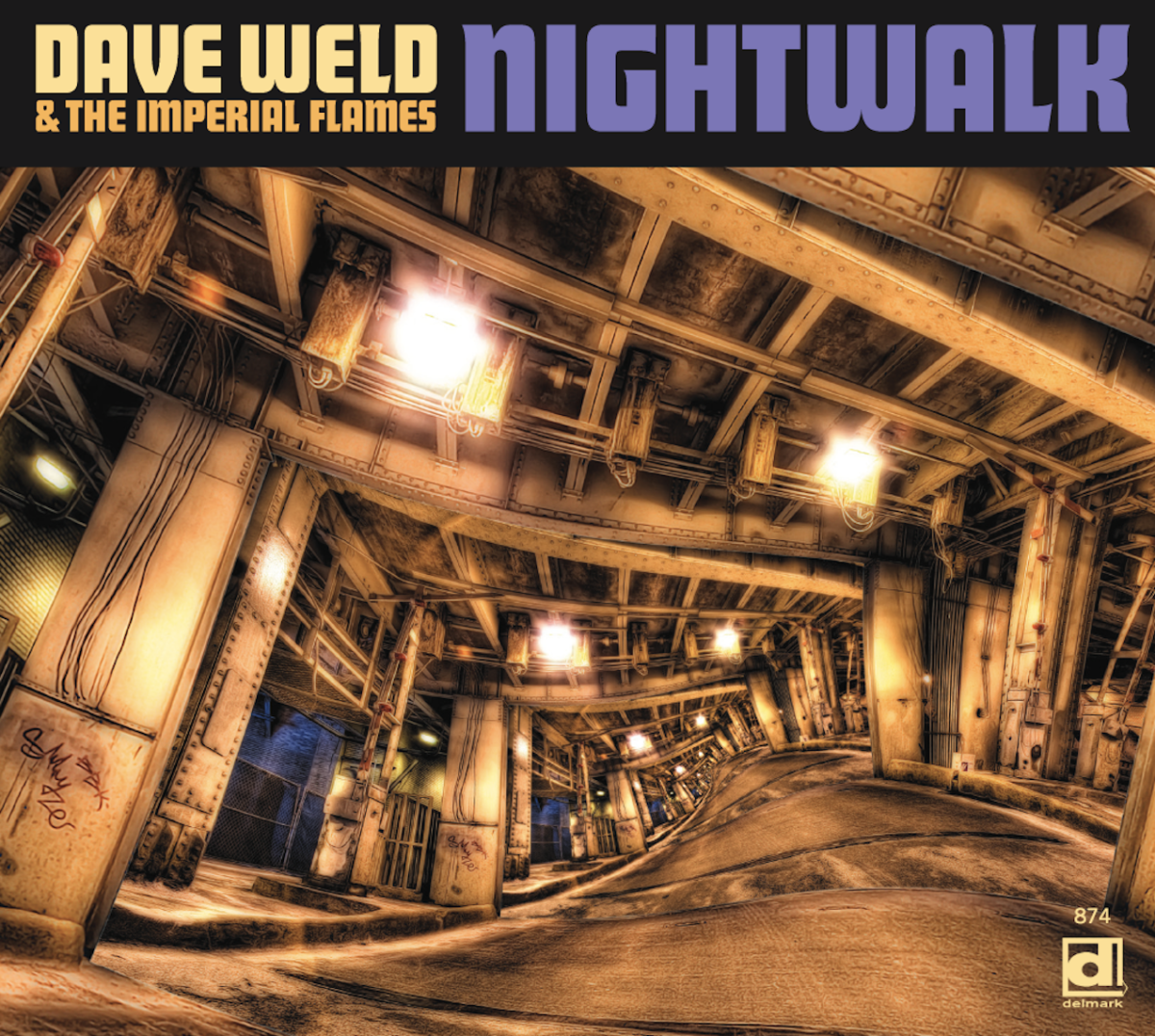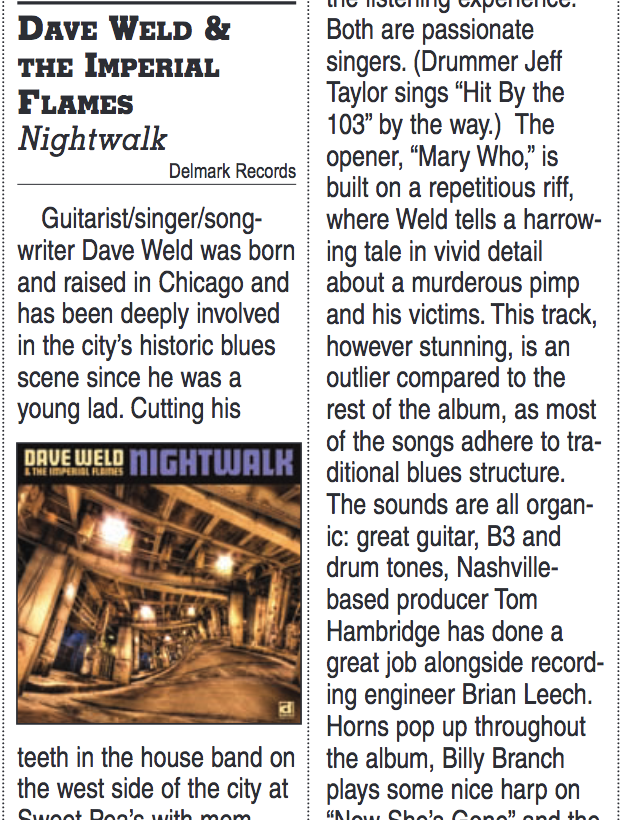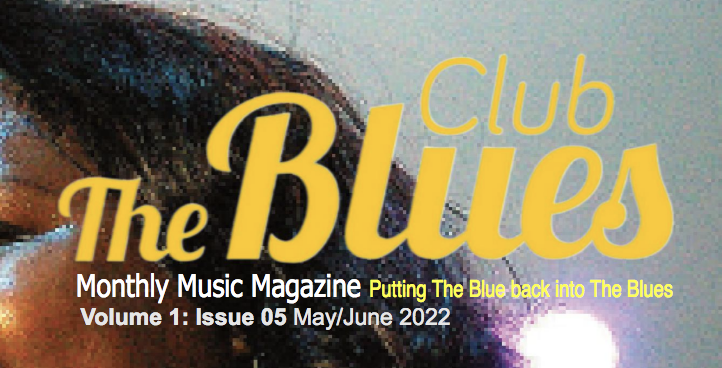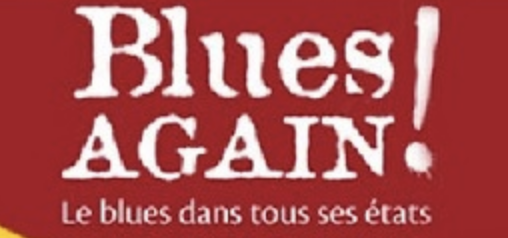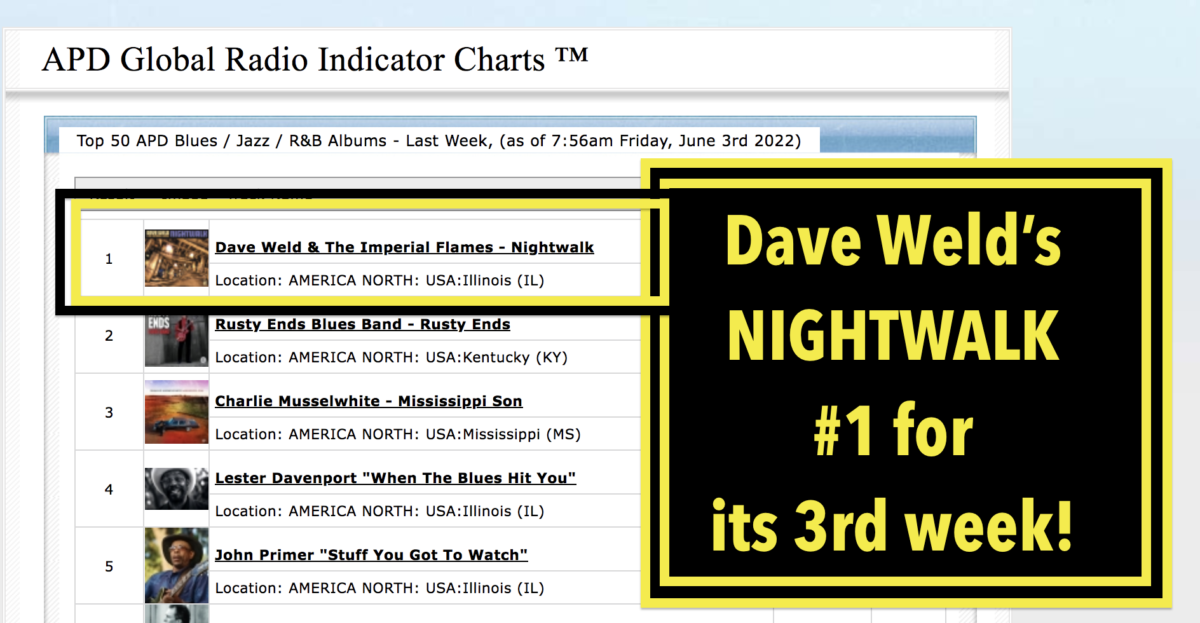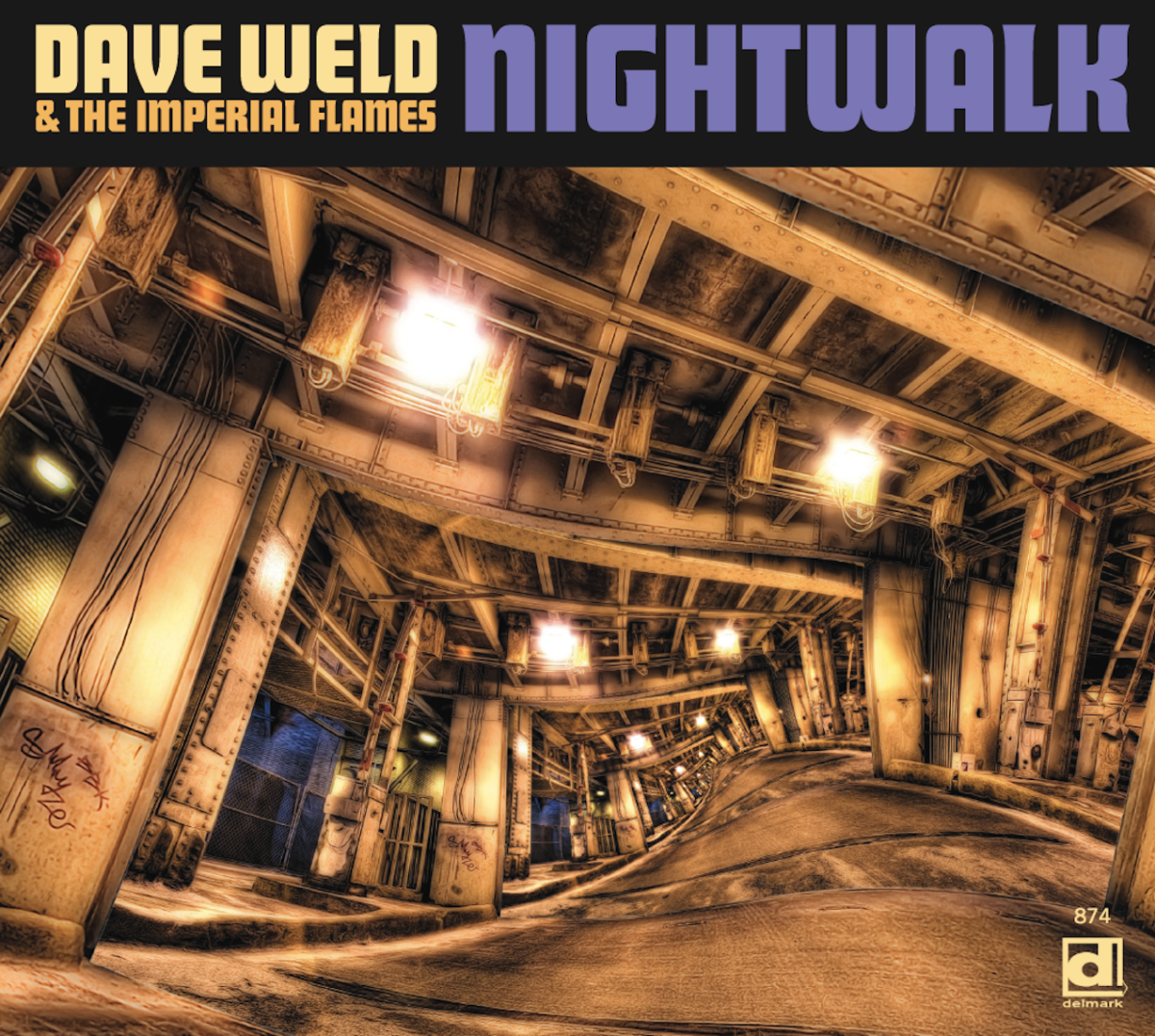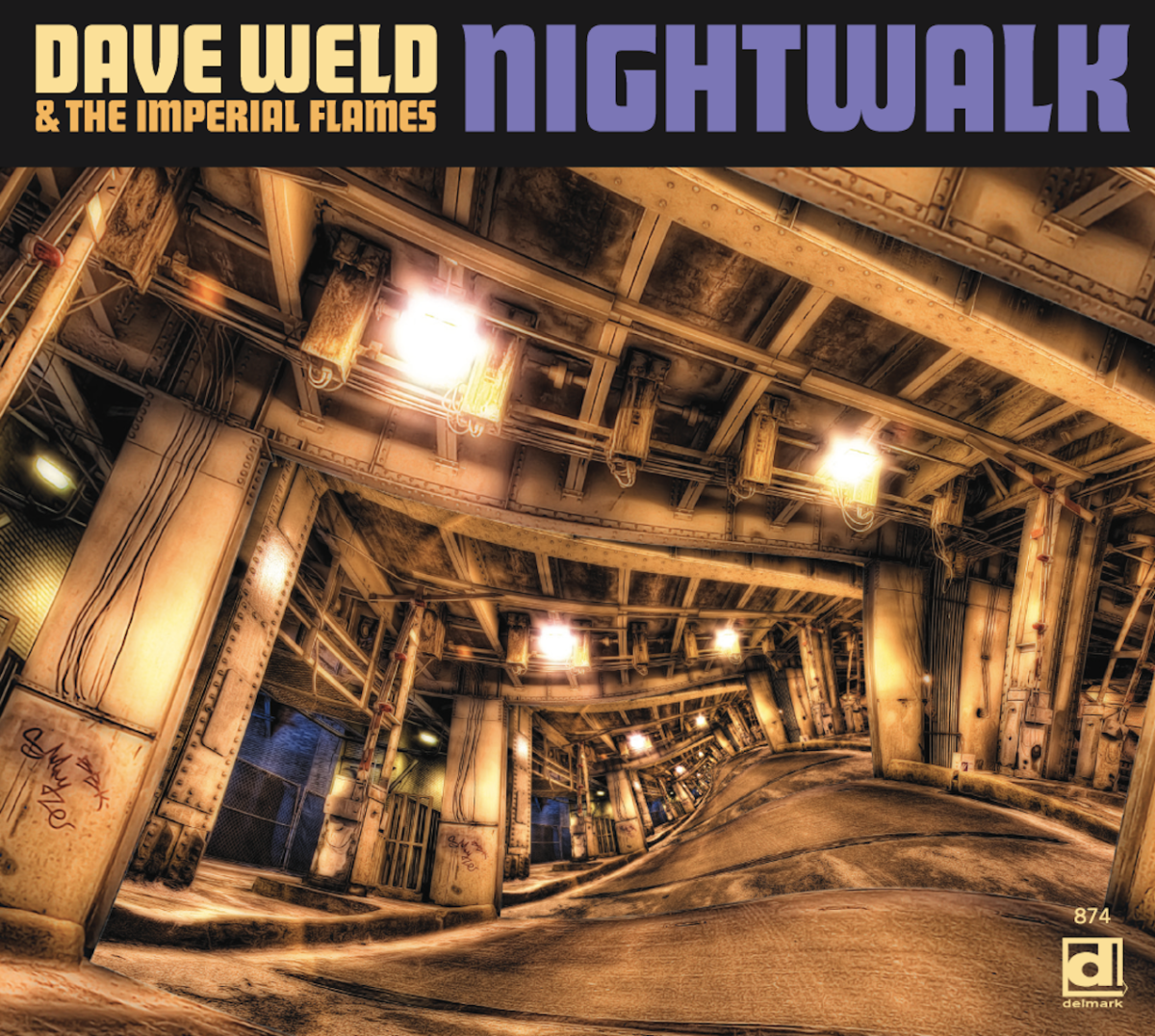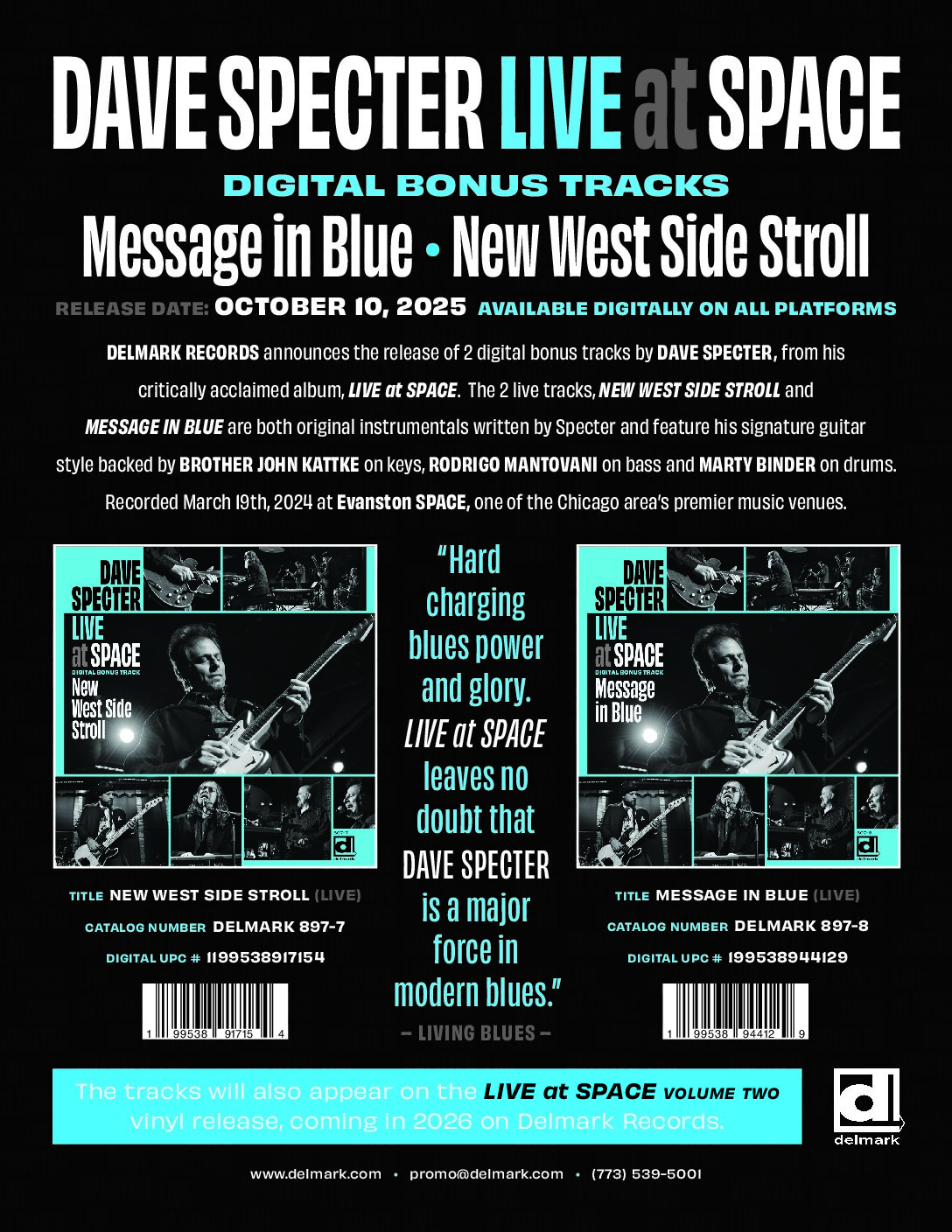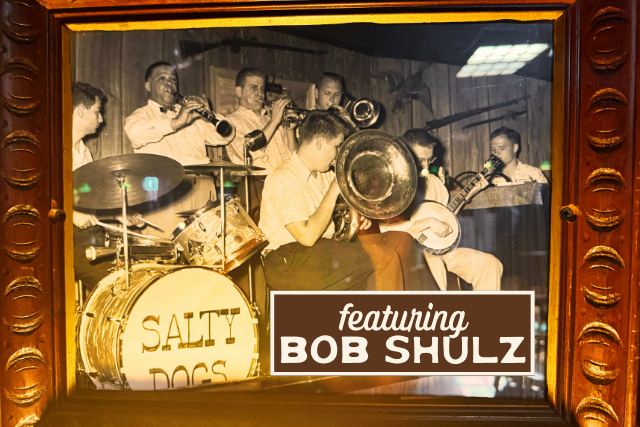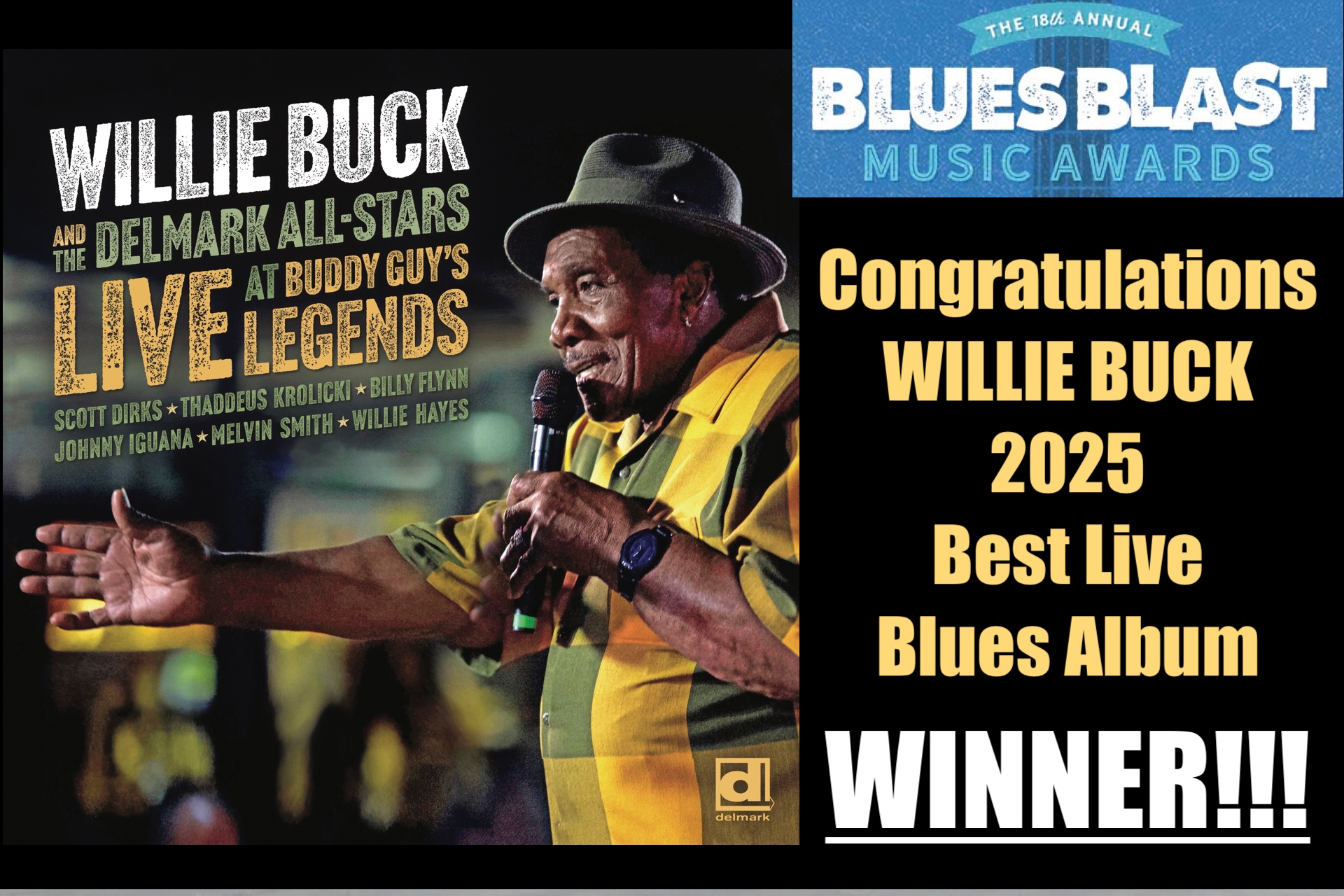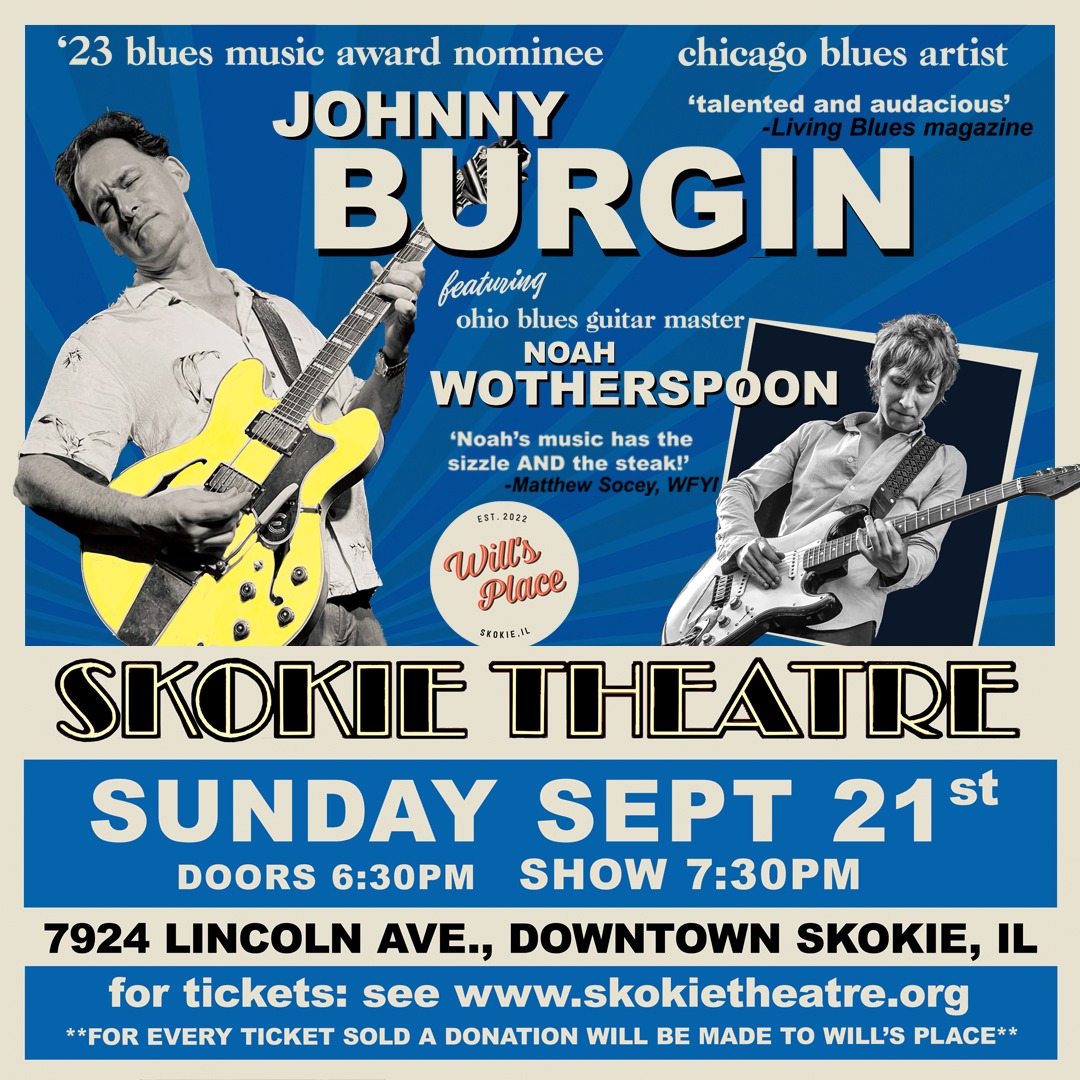“NIGHTWALK” IS THE THIRD DELMARK ALBUM FOR DAVE WELD & THE IMPERIAL FLAMES. Deepening on the furrows opened by “Burnin’ Love” and “Slip Into a Dream”, Dave, Monica and their band weave an original tapestry of pure Chicago blues tradition with a forward-looking sound and energy. Bringing along the beauty of the tradition he learned next to Chicago blues stalwart J.B. Hutto, Dave Weld is one of the few real innovators in the blues realm of today. His song “Mary Who” is an authentic tour de force, a vivid portrait of urban life where Dave Weld shows his metal as storyteller. Moreover, in every single track of this ground-breaking album we can relate to the vibrations of contemporary life blowing like a fresh breeze from the depths of a well-rooted sonority. The album was recorded at Joyride Studio, mixed at The Switchyard Studio in Nashville, produced by Tom Hambridge and post-produced at Delmark Records Riverside Studio by Elbio Barilari and Julia A. Miller, who was also the album’s mastering engineer.



Ready for some down and dirty Chicago blues? Dave Weld & the Imperial Flames are here to take care of you on this gritty, raw, and energetic album. This is Weld’s third release on Delmark and the 12 songs on the album evoke the roughness of the city streets where the urban blues prowl, peering into the shadows where hookers, sex traffickers, and pimps purvey their trade. The raucous stride blues Mary Who tells the tale of pimps in Chicago who trap young girls into a bleak life of streetwalking. The morale of the song, of course, is that the young girls taken into sex slavery new releases quickly become nameless and their identities interchangeable. Weld and the band deliver no scathing indictment, but rather a matter-of-fact acceptance of the lowdown ways of the streets. The Cajun-flavored Red Hot Tabasco slips and slides with a winking and nodding juke joint piano, while Weld’s partner Monica Myhre takes the lead vocal on the shimmering slide guitar–dominated Cry, Cry, Cry. Myhre lends the straight ahead blues rocker Don’t Tell Mama a soaring, Janis Joplin–like character, while her commanding vocals give the horn-drenched Travelin’ Woman its can’t-sit-still power. The galloping rockabilly song Loving You rides along smoking-hot slide guitar riffs. Myhre’s vocals elevate this album with the Imperial Flames providing the layer of sound over which her voice flows. Nightwalk takes us through the alleys and back streets of the Chicago blues, providing some highlights and low lights along the way. —Henry L. Carrigan Jr.- LIVING BLUES

DAVE WELD & THE IMPERIAL FLAMES Nightwalk Delmark Records
Guitarist/singer/songwriter Dave Weld was born and raised in Chicago and has been deeply involved in the city’s historic blues scene since he was a young lad. Cutting his teeth in the house band on the west side of the city at Sweet Pea’s with members of Hound Dog Taylor’s band before moving to the 1815 Club, after a year, sharing the stage with Otis Rush, Hubert Sumlin, Detroit Junior, Eddie Shaw, and especially slide master J.B. Hutto, who mentored the young Weld. He learned from the best, and has carried on the tradition ever since. He was a member of the renowned group Lil’ Ed & the Blues Imperials from the late 70s until 1988, eventually touring the world as one of Alligator Records’ signature acts. He formed his own band, the Imperial Flames, shortly after, releasing albums on Earwig Records as well as on the Blue Sting label. 2022’s Nightwalk is his third release for the respected Delmark Records and is chock full of house rockin’, no holds barred, Chicago blues with a capital “B.” Ten of the twelve songs are co-written by Weld and co-lead vocalist Monica Myhre. The other two numbers are from Dave’s former mentor J.B. Hutto, “Now She’s Gone” and “Loving You” which rolls (pun intended) into Bukka White’s classic “Jelly Roll Blues.” Weld and Myhre alternate lead vocals throughout the session, lending a nice contrast to the listening experience. Both are passionate singers. (Drummer Jeff Taylor sings “Hit By the 103” by the way.) The opener, “Mary Who,” is built on a repetitious riff, where Weld tells a harrowing tale in vivid detail about a murderous pimp and his victims. This track, however stunning, is an outlier compared to the rest of the album, as most of the songs adhere to traditional blues structure. The sounds are all organic: great guitar, B3 and drum tones, Nashville based producer Tom Hambridge has done a great job alongside recording engineer Brian Leech. Horns pop up throughout the album, Billy Branch plays some nice harp on “Now She’s Gone” and the rhythm section of Taylor and bassist Kenny Pickens are constantly locked in. But the focus of the project is most definitely the wild and untamed slide guitar excursions of Dave Weld.—-Bob Monteleone

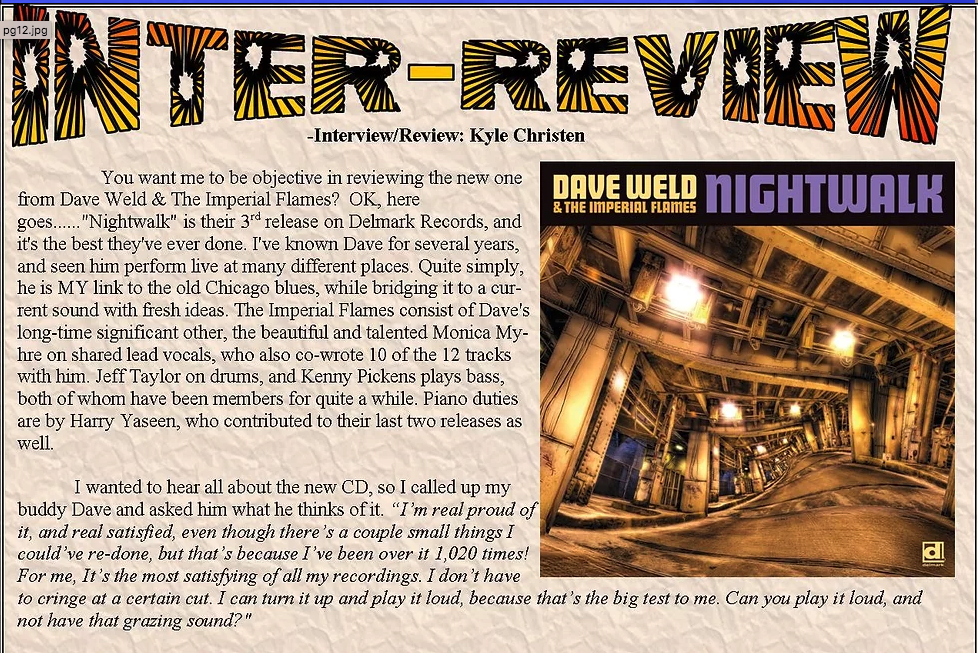

The CHICAGO BLUES GUIDE GIVES ASTOUNDING REVIEW TO DAVE WELD’S NEW ALBUM
By Steve Jones

Ever since I heard Dave Weld live playing “Mary Who” a few years ago, I knew this would become the cornerstone for his next album. We joked how it was so dark it was and maybe not being something folks would accept, but both of us knew he was on to something. Fast forward and here we are with his new, hit album on Delmark Records with “Mary Who” as the leadoff hook song and with an extended version closing the album out. And it’s still a great song!
So let’s take a few steps back. Dave Weld grew up listening to old blues 78 rpm records but in high school jammed on all the stuff people of his age listened to: Clapton, the Stones, Mayall and more. As his bio states, he traded those records in for Howling Wolf, B.B. King, Lightning Hopkins and the many great blues guitar players. He moved to New Mexico after high school and even jammed with Gatemouth Brown in Nevada. After hearing Hound Dog Taylor’s first Alligator Records release and Howling Wolf on the radio, he was moved to return to his sweet home, Chicago.
From there, Dave began playing with Hound Dog Taylor, Eddie Shaw (sax player for Howlin’ Wolf) and all the Chicago greats. He met J.B. Hutto in 1976 and they became lifelong friends. He studied with Hutto for three years and then met his nephews, Little Ed and James “Pookie” Young. They started Little Ed and the Blues Imperials to great accolades, and later Weld went out on his own with The Imperial Flames. For the last 44 years, the Imperial Flames have graced every blues stage in Chicago along with hundreds of others across our nation and the globe. Weld retains that primal, visceral and driving guitar sound for new generations of music fans to marvel at. He is an iconic force in the world of blues guitar.
Weld and Monica Myhre share the lead vocals, and Jeff Taylor also takes the helm for one cut. Weld handles all the guitar work, Jeff Taylor takes care of the drums and Kenny Pickens plays the bass. Harry Yaseem is the primary piano man and Graham Guest adds B-3 and then piano to one cut. Nashville’s Tom Hambridge (who’s won several Grammys for his work with Buddy Guy and Kingfish) did an amazing job producing this album and plays drums on one song. Tony Carpenter adds percussion to a couple of tracks. Sax Gordon appears on three songs on baritone sax and adds his alto sax to one of them. Rogers Randle, Jr. is Dave’s regular saxman and he adds his great sound to several cuts. Chicago horn greats Kenny Anderson and Bill McFarland respectively play trumpet and trombone on a pair of cuts and a very special guest (to be named later) adds harp to one track.
“Mary Who” opens this new album; it is the song about a young gal who takes up the oldest profession and winds up losing her life. It’s an unfortunate tale of woe, and its delivery is both chilling and moving; Dave and band give the listener goosebumps as they tell this tale about the dark side of life. The haunting, backing vocals repeatedly calling, “Who? Mary Who” are superb as is Dave’s guitar, vocals and the overall support of the band.
A driving shuffle follows with stinging slide guitar in “Don’t Ever Change Your Ways.” Weld nails the lead guitar and solos and sings with abandon. The band lays out a vibrant groove as they give us another fine original to enjoy. Dave takes us home on guitar to end this wild ride. Monica is featured with her original “Don’t Tell Mama,” a standard from their live sets that effectively showcases her vocal skills. The song is about not telling mama that her daughter is not coming home, and warns not to break her heart by telling her she’s spending the night with a man mama does not approve of. Myhre is powerful fronting the band, while Weld nails another solo here and the organ solo is also a great addition.
Next is “Red Hot Tabasco” where Weld compares the spiciness of his woman to the famed hot sauce. A sweet piano solo, followed by another super guitar solo, help make this another winner. “Travelin’ Woman” is a funky number with a big horn sound that once again features Monica up front. A keyboard solo and the horns are splendid as the band gives us their all. “Now She’s Gone” is a slick, slow blues with Dave shouting out the blues for all to hear, and Billy Branch joins the fray with his outstanding harp work and soloing. Billy does an excellent job as he always does. Dave also spices things up with another guitar solo. It’s Chicago blues done up just right!
“Cry, Cry, Cry” takes things down a bit in tempo and timbre as Myhre tells her man off; she’s not gonna waste her time any more. Some fine B-3 work is featured here along with more sweet guitar riffs. Next up is “Donde Vas,” with Monica asking, “Where are you going,” in this Latin infused track. Randle offers some delightful tenor sax here as do the brass players — another super song! “She Was A Woman” is a pretty and slow blues where Myhre sings of the foolishness of a young women who was taken advantage of by her man. Weld plays some dark guitar and Monica sings with passion.
The ever ebullient drummer Jeff Taylor leads the next cut with his suave and smooth vocals in “Hit By The 103,” a song about a pedestrian’s lucky day getting ruined when he’s killed by a bus. Weld picks out some cool stuff, the baritone sax gives the bottom end depth, and the alto sax delivers punch. Fortunately, Taylor tells us at the end it was just a dream and jokingly tells us he thinks Toronzo Cannon was driving that bus.
A wild, slide ride follows that with “Loving You.” Weld howls out the lead vocals and wails on his guitar. The West Side sound is obviously alive and well! Piano and organ both round out the sound in this vibrant number. The outro to the song is an extended whirling dervish of piano, organ, guitar, bass, drums and vocals.
Lastly, an extended mix of the opening cut concludes the album. Longer, darker and even cooler as the song fades out and then back in for more driving and musically moving stuff. If there is a song of the year award category for blues, then this song surely belongs in it!
Dave Weld and his band have outdone themselves. This is their third release on Delmark and they offer the listener their tightest and best effort ever with Nightwalk. This is an award worthy record; I most highly recommend this to anyone who loves Chicago blues. This is the real deal and belongs in your music collections!
About the Author: Steve Jones is president of the Crossroads Blues Society of Byron/Rockford, IL
THE HUNGARIAN PUBLICATION “BLUES VAN” ALSO PRAISES DAVE WELD’S NEW ALBUM

Dave Weld studied history and journalism at New Mexico State University before choosing a music career. Initially, Hound Dog played with Taylor’s former fellow musicians, Brewer Philips and Ted Harvey, and then joined the 1815 Club home band in Chicago. He is one of the founders of Lil ’Ed & The Blues Imperials, of which he was a member for almost ten years. He formed his own band, Dave Weld & The Imperial Flames, in the late 1980s. The formation has performed in dozens of countries to date, and has had the opportunity to present itself at the Montreal Jazz Festival and the Chicago Blues Festival, among others. Their brand new album, Nightwalk, was released by Delmark Records. In addition to his own compositions, the publication is part of Weld’s former mentor, J.B. It also includes two numbers from Hutt, while Don’t Ever Change Your Ways is a tribute to Hutto’s memory. “The song is about that after J.B. he left Georgia, he came to Chicago, and I met him at a young age. That’s when he told me to never change my lifestyle. It has prepared me for the pros and cons of this industry, ”said Weld. The guitarist shared the vocal duties with his partner, Monica Myhre, and drummer Jeff Taylor. Billy Branch, Sax Gordon and Tom Hambridge also contributed to the album. Nightwalk is the third album by Dave Weld & The Imperial Flames, released by a renowned Chicago record label founded sixty-five years ago.http://www.bluesvan.hu/
READ FULL ARTICLE ON LINE: CLICK!


Dave Weld & The Imperial Flames Release ‘Nightwalk’ on the Delmark Imprint
‘Nightwalk,’ relesaed May 27 is Weld’s 3rd album on Delmark
By American Blues Scene Staff Facebook
Chicago blues is Dave Weld’s lifeblood. From his beginnings mentored by JB Hutto to his decades with Lil Ed Williams and his Blues Imperials, he has taken the blues around the world.
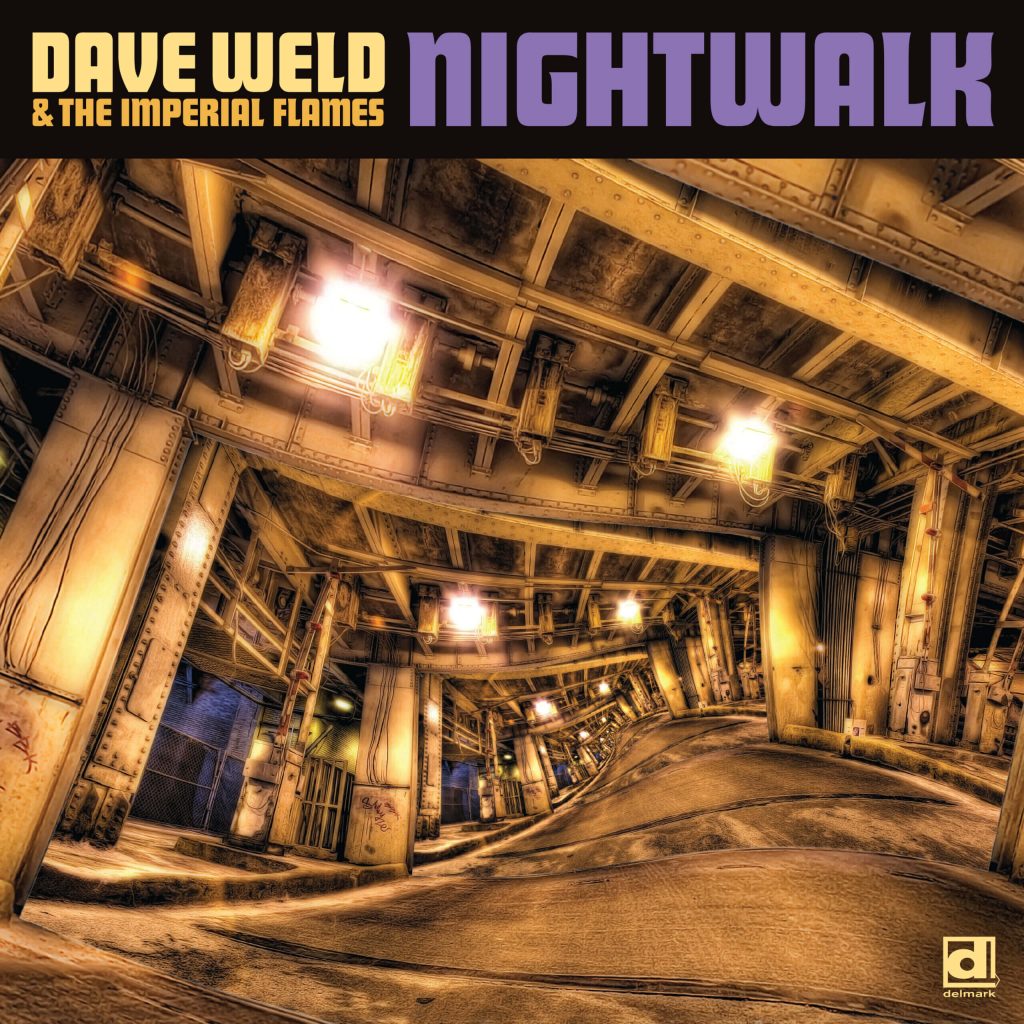
Weldand his Imperial Flames have a brand-new album titled Nightwalk, their third for Chicago’s Delmark Records. Nightwalk deepens the forward-thinking sound and energy of their contemporary blues albums past, weaving an original tapestry of old and new traditions. Highlights include “Mary Who,” an authentic musical tour de force and vivid portrait of urban life and his tribute to JB Hutto, “Don’t Ever Change Your Ways.”
Weld told Blues Blast Magazine that, “It’s about how he schooled me, and prepared me, for the good parts of this industry as well as the bitterness. His advice was don’t let anybody tell you you can’t make it, not your job, your girlfriend, your mother or father, your friends, nobody! That has stuck with me. The song is about him leaving Georgia and coming to Chicago to be a bluesman, and meeting him when I was a young man. That is when he told me to never change my ways.”
The Imperial Flames are a big, horn-driven band and Weld shares vocal duties with his partner Monica Myhre and his drummerJeff Taylor. Longtime friend Billy Branch contributes harp on the Hutto original, “Now She’s Gone” as well. Weldbrought Tom Hambridge in to produce. Hambridge is Buddy Guy’s longtime drummer and producer and has won two Grammy Awards along with multiple nominations for his work with Guy, Susan Tedeschi, James Cotton,andKenny Neal. https://www.youtube.com/embed/cZfhLqFfaeE?feature=oembed
A native of Lake Forest, Weld studied history and journalism at New Mexico State University before returning home for the blues life. He initially earned his keep playing with ex-Hound Dog Taylorsidemen Brewer Phillipsand Ted Harvey at Sweet Peas, then joining up with several former bandmates of Howlin’ Wolf in the house band at the 1815 Club. Weld’s affinity for the blues was apparent to those wary, seasoned veterans. An early supporter was Hutto, a highly regarded slide guitarist.
Weld’s comfort with urban blues was further illustrated when he took on rhythm guitar duties in the fast company of his slide guitar-playing friend Lil Ed Williams in the raw-and-rowdy band they called The Blues Imperials. The acclaimed 1986 album ROUGHHOUSIN‘ captured their incandescent spirit. Weldwas with The Blues Imperials for about ten years before branching off in the late-1980s to lead his own outfit. To date, The Imperial Flames have performed in 26 states, 11 countries, and at about three dozen festivals, among them the Montreal Jazz Festival and, naturally, the Chicago Blues Festival.

DAVE WELD & THE IMPERIALFLAMESNightwalk – DELMARK
Dave Weld & the ImperialFlames (est. 1988) wasteno time going big and bold ontheir raucous Nightwalk throughthe backstreets of hometownChicago. That’s to be expected,though, coming from the superchargedslide guitarist whoapprenticed with J.B. Hutto,tested his mettle for a yearlongstint with ex-Hound Dog Taylorsidemen Brewer Phillips and TedHarvey, and then really explodedonto the national blues radar as afounding member of the roughhousin’new bluebloods Lil’ Ed& the Blues Imperials. As full throttleslide-slashing credentialsgo, those are pretty impeccable.Weld came in hot to thissession, his band’s third forDelmark since 2010. AndGrammy-winning producerTom Hambridge saw to it thattempos didn’t offer much chanceto cool down. Or, at least forany grime to wash off. “MaryWho,” a talking blues of murderousproportion, exemplifiesthe latter. “Don’t Ever ChangeYour Ways,” a shout-out toHutto and one of 10 originals,furiously reverts to the stompingformer. The Flames’ bank ofhorns kicks in for a total changeduring “Travelin’ Woman” andthe bilingual “Donde Vas.” Bothtimes are also among those whenWeld, who prefers barking outlyrics in the manner as did hismentor, transfers vocal duties toMonica Myhre’s more sculptedtones.Whether cha-cha-cha’ing“Red Hot Tabasco” or grindingaway at Hutto’s “Now She’sGone” (with extra tailwind gustingfrom Billy Branch’s guestharp), those steel-on-steel frenziesrace up and down the guitarneck. Because, let’s face it: Evenwhen Myhre is up at the micimploring “Don’t Tell Mama,”Weld is out there to blatantlyblow you out of the seat. DENNIS ROZANSK
DAVE WELD RECEIVES GREAT REVIEW FROM BELGIUM

Dave Weld was born in Chicago and was already influenced by blues music as a child, which he played on an old Victrola phonograph. In high school he traded his Stones, Clapton and Mayall records for Howlin’ Wolf, Lightnin Hopkins and BB King. After high school, Dave moved to New Mexico to study guitar with Kurt Black, a jazz musician who worked with Benny Carter, Grant Green, and artists from the NY jazz scene. In Nevada he met blues musician Gatemouth Brown.Dave Weld managed to perform in South Chicago (where mainly black musicians played) with blues guitarist Brewer Phillips (Hound Dog Taylor). At Club 1815 owned by owner/saxophonist Eddie Shaw, Holwin’ Wolf’s band played the Wolf Pack. Dave played in the band and can be heard on ‘Chico Chism’s West Side Blues Party’ (1978) feat. Eddie Shaw, Hubert Sumlin, Jewtown Burke, Billy Branch, Detroit Junior, Shorty Gilbert, Boston Balckie, Hiwayman & Dave Weld (rhythm guitar). During that period, Weld was guided and cared for by his mentor Joseph Benjamin “J.B.” Hutto (1926-1983), Grammy winner and Blues Hall of Fame slide man from Georgia. Dave stayed with Hutto for three years and was then introduced to Hutto’s cousins blues slide guitarist Little Ed (Williams) and his half brother James “Pookie” Young. They started in 1975 with the band Lil’ Ed & the Blues Imperials and released their debut album ‘Roughhousing’ (1986) in Chicago with Alligator.In 1988 Dave Weld & the Imperial Flames was founded. The Imperial Flames, which has a great horn section, is known as one of the oldest and most active groups in Chicago. For years they have been weaving an original tapestry of pure Chicago blues tradition with a forward-looking sound and energy. The sound they put out is raw and daring. Little Ed played in the band for two years. During that period they released ‘Keep on Walkin’ (1996) on the Earwig label. When Lilttle Ed did not play in Weld’s band, saxophonist Abb Locke replaced him. The other band members were singer Monica Myhre (Monica Garcia), drummer Jeff Taylor and bassist Dave Kaye.Nightwalk is the third Delmark release from Dave Weld & the Imperial Flames. Dave, Monica Myhre and the band previously recorded ‘Burnin’ Love’ (2010) with producer Bob Koester and ‘Slip into a Dream’ (2015) for Delmark. Dave Weld is one of the few true innovators in the blues realm today, retaining the beauty of the tradition he learned from his mentor and Chicago blues master J.B. hutto.The album was recorded at Joyride Studio, mixed at The Switchyard Studio in Nashville, produced by Tom Hambridge and post-produced at Delmark Records Riverside Studio by Elbio Barilari and Julia A. Miller, who was also the album’s mastering engineer.Dave Weld’s song “Mary Who”, which opens the album (an “extended” version with Sax Gordon follows at the end of the album), is an authentic tour de force, a vivid portrait of urban life. On “Don’t Ever Change Your Ways” Dave demonstrates his skills as an experienced slide guitarist, while Jeff Taylor keeps the rhythm tight behind his drums. Dave shares lead vocals with Monica Myhre. She takes over from him convincingly on “Don’t Tell Mama”, accompanied here by pianist Harry Yaseen and the great Graham Guest on B3 organ. For the somewhat Latino tinted “Red Hot Tabasco”, the much sought-after Tom Hambridge, who is the producer of the album, took a seat behind the drums himself. It is the penultimate song of the first series (of nine in total) that Dave wrote together with Monica. This is followed by “Travelin Woman” with Yaseen playing his piano beautifully and “Now She’s Gone”, a J.B. Hutto original. In addition to Monica, “special guest” Billy Branch (harp) also contributed to this song. The rocking medley “Loving You/Jelly Roll Blues”, which follows later, is also a J.B. Hutto song, which he wrote with Bukka White (1906-1977) and which Hutto recorded with his Hawks in 1953. Latin tunes are also further combined with blues on “Donde Vas” with the addition of the Spanish phrase “Where are you going?”. On “She Was a Woman” Guest briefly switches his organ for the piano and, as if the wind players weren’t endowed enough, saxophonist Sax Gordon does his thing enthusiastically on “Hit by the 103” as in the closing track.“Anchored in the pure tradition of Windy City and with a masterful eye for the Chicago sound and dynamics, Dave Weld digs on, on his great new Delmark release, ‘Nightwalk’…” . Eric Schuurmans (translated by Elbio Barilari)
FRENCH MAGAZINE “BLUES AGAIN” PRAISES DAVE WELD’S NEW ALBUM “NIGHTWALK”, thank you Gilles Blampain!
With Dave Weld there is no question of calming down, the energy overflows from each note. The tempo is lively, the sound is powerful and solid. His band The Imperial Flames, which has a great horn section, is renowned as one of the oldest and most active groups in Chicago. And as if that were not enough, Sax Gordon comes in support with his saxophone on four titles. The sound they send, house-rocking, boogie or soul, is raw and gutsy. Dave Weld shares the vocals with his partner Monica Myhre with whom he jointly signs 9 compositions (one of which ‘Mary Who’ is taken up in an extended version at the end of the album). Special guest, Billy Branch intervenes on the harmonica on a song by JB Hutto, ‘Now She’s Gone’. Latin tunes ae combined with the blues with the addition of a Spanish expression for ‘Donde Vas’. Bukka White and again JB Hutto are in the spotlight with a medley: ‘Loving You / Jelly Roll Blues’. Production was handled by the highly sought-after Tom Hambridge. Anchored in the pure tradition of the Windy city with a dazzling sound and genuine dynamics, Dave Weld digs an innovative furrow by inscribing his personal tone in a manifest modernity. Gilles Blampain

#1 on the Radio for 3 Weeks in a Row…


PRESS & RADIO: for INTERVIEWS, PHOTOS, DIGITAL DOWNLOADS, etc, please contact Kevin Johnson at promo@delmark.com and Heather West at westernpublicity@gmail.com You can always reach out to Delmark’s Artistic Director Elbio Barilari at elbio@delmark.com

Dave Weld was born in Chicago in 1952 and his interest in the Stones, Clapton and Mayall started changing in high school when he heard Howlin’ Wolf, Lightnin Hopkins, and B.B. King. After high school Weld moved to New Mexico and studied jazz and met and jammed with Gatemouth Brown. Weld then heard Hound Dog Taylor and landed a gig with his band. He also played with Eddie Shaw and the Wolf Pack. After Hound Dog’s death he began working with JB Hutto. Included on Nightwalk are Weld lead, rhythm and slide guitar, Monica Myhre lead and backup vocals, Harry Yaseen and or Graham Guest piano, Kenny Pickens, bass and Jeff Taylor drums. Tom Hambidge is the producer and he guests on drums on “Red Hot Tabasco”. Sax Gordon plays baritone sax on “Mary Who”, and both baritone and alto on “Hit By The 103” with Myhre on vocal. Rogers Randle Jr. plays Alto sax on “Travelin’ Woman” and also “Donde Vas” also with Myhre. Also on “Travelin’ Woman” Kenny Anderson plays trumpet, and Bill McFarland plays trombone. Billy Branch plays harp on J.B. Hutto’s “Now She’s Gone” with a new arrangement from Weld. Weld also re-arranges Hutto’s “Loving You/Jelly Roll Blues”. Dave Weld is carrying on the Hutto tradition.
Richard Ludmerer
Contributing Editor/Making A Scene
KEYS & CHORDS MAGAZINE GIVES A 5 STAR REVIEW TO DAVE & HIS BAND
Blues guitarist, vocalist, songwriter and bandleader Dave Weld has been active on Chicago’s West Side since the late 1970s. He was born in Lake Forest and studied history and journalism at New Mexico State University. And yet he chose a musical career. Weld initially earned his living performing with Hound Dog Taylor’s sidemen Brewer Phillips and Ted Harvey and the band Sweet Peas. At the 1815 Club on Roosevelt Road, Dave played in the house band that included Chico Chism, Hubert Sumlin, Detroit Junior, Eddie Shaw, and Shorty Gilbert. There, he would accompany greats such as Otis Rush, Tail Dragger and Johnny Littlejohn. Under the wing of J.B. Hutto , Dave would soon grow into a spectacular slide guitarist. Weld’s comfort with urban blues was further illustrated when he took on rhythm guitar duties in the company of his slide guitar playing friend Lil’ Ed Williams in the raucous band they called The Blues Imperials. The critically acclaimed 1986 album ‘Roughhousin’ captured their glowing minds. Weld was with The Blues Imperials for about ten years before splitting off in the late 1980s to start his own career.The release of ‘Burnin’ Love’ was Weld’s debut with the renowned Chicago Delmark Records, the label of the late Bob Koester. So now there is the long-awaited album ‘Nightwalk’, which is already out on Delmark Records. Along with his The Imperial Flames, Weld shares vocals with his partner Monica Myhre and his drummer Jeff Taylor. Soulmate Billy Branch plays harp on Hutto’s original ‘Now She’s Gone’. Weld has managed to land a multi-award-winning artist with producer/drummer Tom Hambridge. Together with his Flames, Dave opens with the storytelling song ‘Mary Who’. Things suddenly go up a gear in ‘Don’t Ever Change Your Ways’ and ‘Don’t Tell Mama’, where Monica does the vocal honors, and she has apparently grown into her role as a blues diva. With ‘Red Hot Tabasco’ we go to New Orleans for a while and the funky ‘Traveling Woman’ also takes us to the Crescent City. The slow blues ‘Now She’s Gone’ is a big nod to Muddy, just like the español-mexicano ‘Donde Vas’ (Where are you going), which has been interpreted by Monica. The ballad ‘She Was A Woman’ contrasts with the funky ‘Hit By The 103’. Weld also winds his slide around his strings for the exciting “Loving You / Jerry Roll Blues,” original by J.B. Hutto and Bukka White. The closing ‘Mary Who’ ((extended version) is an authentic, varied and expressive Chicago blues. Clever!
Phillip Verhage (translated by Elbio Barilari)
ORIGINAL ARTICLE by Phillip Verhage 
 | Bluesgitarist, vocalist, songwriter en bandleider Dave Weld is sinds de late jaren ‘70 actief op de West Side van Chicago. Hij werd geboren in Lake Forest en studeerde geschiedenis en journalistiek aan de New Mexico State University. En toch verkoos hij een muzikale carrière. Weld verdiende aanvankelijk zijn brood met het performen bij ex-Hound Dog Taylor-sidemen Brewer Phillips en Ted Harvey én de band Sweet Peas. In de 1815 Club op Roosevelt Road, speelde Dave in de huisband met onder meer Chico Chism, Hubert Sumlin, Detroit Junior, Eddie Shaw en Shorty Gilbert. Daar zouden hij grootheden als Otis Rush, Tail Dragger en Johnny Littlejohn begeleidden. Onder de vleugels van J.B. Hutto zou Dave al vrij vlug uitgroeien tot een spectaculaire slidegitarist. Welds comfort met enige urban blues werd verder geïllustreerd toen hij ritmegitaartaken op zich nam in het gezelschap van zijn slidegitaar spelende vriend Lil’ Ed Williams in de rauwe band die ze The Blues Imperials noemden. Het veelgeprezen album ‘Roughhousin’ uit 1986, veroverde hun blakende geest. Weld was ongeveer tien jaar bij The Blues Imperials voordat hij eind jaren tachtig afsplitste om zijn eigen carrièremove te accorderen. De release ‘Burnin’ Love’ was dan Welds debuut bij het gerenommeerde Chicago Delmark Records, het label van wijlen Bob Koester. Nu is er dus het langverwachte album ‘Nightwalk’, dat alweer verschijnt op Delmark Records. Samen met zijn The Imperial Flames, deelt Weld de vocalen met zijn partner Monica Myhre en zijn drummer Jeff Taylor. Soulmate Billy Branch speelt harp op Hutto’s origineel ‘Now She’s Gone’. Weld heeft met producer/drummer Tom Hambridge een multi-award winnende artiest weten te strikken. Samen met zijn Flames opent Dave met de storytelling song ‘Mary Who’. En dan gaat het plots enkele versnelling hoger in ‘Don’t Ever Change Your Ways’ en ‘Don’t Tell Mama’, waar Monica de vocale honneurs waarneemt. En zij is blijkbaar gegroeid in haar rol als bluesdiva. Met ‘Red Hot Tabasco’ gaan we voor even naar New Orleans en ook het funky ‘Traveling Woman’ brengt ons naar de Crescent City. De slowblues ‘Now She’s Gone’ is met een vette knipoog naar Muddy, net zoals het Español Mexicano ‘Donde Vas’ (Where are you going) is geïnterpreteerd door Monica. De ballade ‘She Was A Woman’ contrasteert dan weer met het funky ‘Hit By The 103’. Weld slingert zijn slide ook rond zijn snaren voor het opwindende ‘Loving You / Jerry Roll Blues’, origineel van J.B. Hutto en Bukka White. Het afsluitende ‘Mary Who’ ((extended version) is een authentieke, gevarieerde en expressieve Chicago blues. Knap! |


Dave Weld & The Imperial Flames – Nightwalk
Format: CD
Label: Delmark Records
Release: 2022
Release date: May 27, 2022
Chicago blues is Dave Weld’s lifeblood. From his beginnings mentored by JB Hutto to his decades with Lil Ed Williams and his Blues Imperials, he has taken the blues around the world. Weld and his Imperial Flames have a brand new album titled “Nightwalk,” their third for Chicago’s Delmark Records, out May 27th.
“Nightwalk” deepens the forward-thinking sound and energy of their contemporary blues albums past, weaving an original tapestry of old and new traditions. Highlights include “Mary Who”, an authentic musical tour de force and vivid portrait of urban life and his tribute to Hutto, “Don’t Ever Change Your Ways”. Weld told Blues Blast Magazine that, “It’s about how he schooled me, and prepared me, for the good parts of this industry as well as the bitterness. His advice was don’t let anybody tell you you can’t make it, not your job, your girlfriend, your mother or father, your friends, nobody! That has stuck with me. The song is about him leaving Georgia and coming to Chicago to be a bluesman, and meeting him when I was a young man. That is when he told me to never change my ways.”
The Imperial Flames are a big, horn-driven band and Weld shares vocal duties with his partner Monica Myhre and drummer Jeff Taylor. Longtime friend Billy Branch contributes harp on the Hutto original, “Now She’s Gone” as well. Weld brought Tom Hambridge in to produce. Hambridge is Buddy Guy’s longtime drummer and has won two Grammy Awards along with multiple nominations for his work with Guy, Susan Tedeschi, James Cotton and Kenny Neal.
A native of Lake Forest, Weld studied history and journalism at New Mexico State University before returning home for the blues life. He initially earned his keep playing with ex-Hound Dog Taylor sidemen Brewer Phillips and Ted Harvey at Sweet Peas, then joining up with several former bandmates of Howlin’ Wolf in the house band at the 1815 Club. Weld’s affinity for the blues was apparent to those wary, seasoned veterans. An early supporter was Hutto, a highly regarded slide guitarist.
Weld’s comfort with urban blues was further illustrated when he took on rhythm guitar duties in the fast company of his slide guitar-playing friend Lil Ed Williams in the raw-and-rowdy band they called the Blues Imperials. The acclaimed 1986 album ROUGHHOUSIN’ captured their incandescent spirit. Weld was with the Blues Imperials for about ten years before branching off in the late-1980s to lead his own outfit. To date, the Imperial Flames have performed in 26 states, 11 countries, and at about three dozen festivals, among them the Montreal Jazz Festival and, naturally, the Chicago Blues Festival.
Website: https://www.daveweld.com/
Dave Weld: Nightwalk Blues On The Slide
Chicago blues is Dave Weld’s lifeblood. From his beginnings mentored by JB Hutto to his decades with Lil Ed Williams and his Blues Imperials, he has taken the blues around the world. Weld and his Imperial Flames have a brand-new album titled “NIGHTWALK,” their third for Chicago’s Delmark Records will be released on May 27th. “NIGHTWALK” deepens the forward-thinking sound and energy of their contemporary blues albums past, weaving an original tapestry of old and new traditions. Moreover, in every single track of this ground-breaking album we can relate to the vibrations of contempo- rary life blowing like a fresh breeze from the depths of a well-rooted sonority. The album was recorded at Joyride Studio, mixed at The Switchyard Studio in Nashville, pro- duced by Tom Hambridge and post-produced at Delmark Records Riverside Studio by Elbio Barilari and Julia A. Miller, who was also the album’s mastering engineer. The Imperial Flames are a big, horn-driven band and Weld shares vocal duties with his partner Monica Myhre and his drummer Jeff Taylor. Longtime friend Billy Branch contributes harp on the Hutto original, “Now She’s Gone” as well. Hambridge is Buddy Guy’s longtime drummer and producer and has won two Grammy Awards along with multiple nominations for his work with Guy, Susan Tedeschi, James Cotton, and Kenny Neal.
Q&A with Chicago-based veteran blues musician Dave Weld, one of the few real innovators in the blues realm of today
by Michael Limnios Blues Network
“JB Hutto is still popular because his blues were so essential and broken down to a really pure form. You could never get more authentic blues, and he wrote all his tunes, so when you hear JB, you hear his lyrics, his singing, his guitar, his slide and his band.”
A native of Lake Forest, Weld studied history and journalism at New Mexico State University before returning home for the blues life. He initially earned his keep playing with ex-Hound Dog Taylor sidemen Brewer Phillips and Ted Harvey at Sweet Peas, then joining up with several former bandmates of Howlin’ Wolf in the house band at the 1815 Club. Weld’s affinity for the blues was apparent to those wary, seasoned veterans. An early supporter was Hutto, a highly regarded slide guitarist. Weld’s comfort with urban blues was further illustrated when he took on rhythm guitar duties in the fast company of his slide guitar-playing friend Lil Ed Williams in the raw-and-rowdy band they called The Blues Imperials. The acclaimed 1986 album ROUGHHOUSIN’ captured their incandescent spirit. Weld was with The Blues Imperials for about ten years before branching off in the late-1980s to lead his own outfit. To date, The Imperial Flames have performed in 26 states, 11 countries, and at about three dozen festivals, among them the Montreal Jazz Festival and, naturally, the Chicago Blues Festival
How has the Blues influenced your views of the world and the journeys you’ve taken?
The blues has helped introduced a basic humanity to me, for all cultures, and for the impoverished or marginalized as well. In Dave Weld and the Imperial Flames we have worked with band members from the South Side, the North Side and the West side, and no matter their economic condition, they have poured their heart into their music. Yes, I thought that I could try to do something that would give me the best self-expression, really my way of being the most creative, and productive, and to try and get women as well, of course. But since I began playing, the many experiences we go through as a musician, crossing cultural lines, changes my world view because of the empathy that comes with being a close team. It also gives me respect to be among those, and work with those, that give their lives for blues music!
“Don’t take yourself too seriously, and yet, keep working FOR yourself. I really thought I was great for a while when I was young, and now I can see where I could have done better. Now I try more honestly to do better, and take suggestions and not get too discouraged, because there are so many great musicians out there to choose from, I just want to be one of them and to be myself.” (Photo: Dave Weld, Chicago Il)
Currently you’ve one more release with Delmark Records. How did that relationship come about?
This is my third release with Delmark, first “Burning Love”, then “Slip into a dream”, and now “Nightwalk”!! “Nightwalk is our best album, and it’s inception has many roots. First, Monica and I called multi-Grammy winning Tom Hambridge and asked him if he would be interested in producing our album. He said yes, lets do it right now! This was because he is Buddy Guy’s drummer and they were playing Buddy’s January homestand at Legends! That worked out since Tom was in town and we did three days of recording! It was really great, and Tom helped in so many ways and he played the drums on one cut as well!
Then we won the Windy City Blues Challenge in Chicago and went down to Memphis to compete in the International Blues Challenge! During that week we made it all the way to the top finalists, and we met and talked with Julia Miller and Elbio Barilari, the new owners of the venerable Chicago blues label. They were knocked out with our show! They loved the band, and all our new material! Especially “Mary Who”! They encouraged us and we found out we had a lot in common!
We then went back to Chicago and started editing and doing overdubs. This was the height of covid now! We not down to Nashville to the Switchyard Studio and mixed with Tom Hambridge and his engineer Michael St Leon. We then brought it to Julia and Elbio and they loved it, and told us how it could be better, and they helped us to mix it some more, as well as buy original artwork for the cover and they hired Frank Hadley from Downbeat to write the liner note! Now you have the best album of my life!
Do you have any interesting stories about the making of the new album “Nightwalk”?
We had to go down to the studio during the height of Covid, and since it was all a mystery, we sprayed the studio with Lysol every night we worked.
When we went down to Nashville the producer, Tom Hambridge, had to push us out of the snow, so we could drive back to Chicago. We worked so hard every day playing, and working on the lyrics, we were exhausted. But it really helped because we wanted to get to the very essence of each song, what it needed, and the best execution possible, for solos, vocal, and arrangements!! I did not know Billy Branch wanted to come down and play and that was a fun night. Brian Leech was one of the best engineers I ever met, and he put his heart into the project! Without Brian I do not know what we would have done, he contributed so much!
“The blues has helped introduced a basic humanity to me, for all cultures, and for the impoverished or marginalized as well. In Dave Weld and the Imperial Flames we have worked with band members from the South Side, the North Side and the West side, and no matter their economic condition, they have poured their heart into their music.” (JB Hutto & The New Hawks with Dave Weld / Photo © by Emily Goodfader)
How did you hook up with JB Hutto? Why do you think that JB Hutto’s Blues continues to generate such a devoted following?
I met JB through Jim O Neal, the founder of Living Blues Magazine! I had contacted Jim previously to do a story on Gatemouth Brown, but when I came to Chicago, Jim gave me the assignment to do a story on JB. It turned out to be the cover story of Living Blues! At the time I was playing with my second band, The Wolf Pack, headed by Eddie Shaw, and Hubert Sumlin, Chico Chism, Detroit Junior, and “Shorty” Gilbert! But this second band was playing at the 1818 Club, and they were Howin Wolf’s band, and they were doing a home stand after he passed.
That broke up after one year of playing and I started going over to JB Hutto’s house in Harvey for lessons every week. JB would take me out to the clubs and it was great. Then JB made me play second guitar behind him, so he could practice, and then he made me play lead guitar as well. That is why I wrote the dedication to JB in our new album, and I called it “Don’t ever change your ways” because JB told me over and over to never quit, no matter what anyone said or did!!
Before that, my first band was the Houserockers, Hound dog’s band of Ted Harvey and Brewer Phillips. When Hound Dog died of cancer they were playing at Sweet Peas, on the Southside, and I gigged with them every weekend for a long time. Eventually they ended up with JB Hutto and they toured the East Coast
JB is still popular because his blues were so essential and broken down to a really pure form. You could never get more authentic blues, and he wrote all his tunes, so when you hear JB, you hear his lyrics, his singing, his guitar, his slide and his band. The older I get the more I love JB’s music more and more. He always told me, “write yours songs like a full grown man!”, and everyone loved his original songs and they still do!!
“I have learned that by helping others, you can help yourself, because if you did not have the strength, you could not help anyone. By helping people, you get the strength to help yourself! ” (Photo: Dave Weld on stage with Ted Harvey on drums and Brewer Philips on guitar, Chicago Il)
What would you say characterizes Chicago blues scene in comparison to other local US scenes and circuits?
There is more of it and it connects more deeply with the migration of blacks coming from the delta, to get jobs in Chicago. Remember “Sweet Home Chicago” by Robert Johnson? Well, it was really true! Except now the musicians can all do a little pop and rock and most of the old juke joints on the South and West Side have died away. But the tradition still exist here and everyone knows the blues in Chicago!
What are your hopes and fears for the future of the Blues? What touched you from THE BLUES IN THE SCHOOLS PROGRAM?
Those kids are so sweet, and playing for them is like being the Beatles! They all rush the stage, they sing along, they clap in time, and they just have so much enthusiasm to sing the blues. Of course, they would like many kinds of music that would come in and entertain, but that is where the Crossroads Blues Society, and Steve Jones comes in. These blues societies are our life blood, and they really care about the future, so they raise money to provide these really enthusiastic kids with good blues in person!
Record companies like Delmark are our lifeblood!! Delmark will be celebrating 75 years this October and we are going to do a concert for, and with all the Delmark artists! Without Delmark there would be a giant hole in the blues world!
I really, really hope there is a blues revival, like in the 60″s when I first found the blues! That was of course because the Rolling Stones and Clapton, and many more from UK showed us our own music. BUT when the Blues Brothers came out it was great, and we got many more gigs, and when Stevie Ray came out he helped us too and we go a lot of interest, and gigs, in the blues! Bob Koester always told me that the best way to preserve the blues is to write good songs that are a hit and live on, Like “The thrill is gone” which made the pop charts! Bob said that is why Trad jazz died, because they kept doing the same old songs. (Photo: Dave Weld & Monica Myhre, Chicago IL 2016)
“There is more of it and it connects more deeply with the migration of blacks coming from the delta, to get jobs in Chicago. Remember “Sweet Home Chicago” by Robert Johnson? Well, it was really true! Except now the musicians can all do a little pop and rock and most of the old juke joints on the South and West Side have died away. But the tradition still exist here and everyone knows the blues in Chicago!”
Are there any memories from Otis Rush, Hubert Sumlin, and Detroit Junior which you’d like to share with us?
I was playing at the legendary 1815 club, with the Wolf Pack, and Otis Rush came up on stage and the first thing he said was, he pointed to me and said, “hey, your third string is out of tune!, I ‘m sorry but play so much music, it bothers me!” I tuned that string up pronto! Hubert gave me advice too, but he would not teach me, because he said, “those young boys, Earth Wind and Fire, I taught them guitar, and they wouldn’t even let me on stage, said there is this old man who wants to play” So he said he quit teaching. Lucky I could turn to JB Hutto for lessons! Detroit was a fun guy, and he was short with a contagious smile. We loved his hit, he always did “If I hadn’t got high”! It was a funny and yet soulful song about all the hardships he caused himself by drinking too much! He worked very hard!
What are some of the most important lessons you have learned from your experience in the music paths?
Don’t take yourself too seriously, and yet, keep working FOR yourself. I really thought I was great for a while when I was young, and now I can see where I could have done better. Now I try more honestly to do better, and take suggestions and not get too discouraged, because there are so many great musicians out there to choose from, I just want to be one of them and to be myself. I was taught by JB Hutto and by Bob Koester of Delmark to write my original songs, and now I see I should have learned more cover tunes. But in the long run it is all the same because your cover tunes show your own personal arraignments, just the way your original do, because you still have your own style. I just want to get the best at my own style, and be me, and help the other band members to be themselves, especially Monica Myhre, who saved my life, and Jeff Taylor, because it would be my highest goal to be as the best they can be! I have learned that by helping others, you can help yourself, because if you did not have the strength, you could not help anyone. By helping people, you get the strength to help yourself! Thank you and God Bless you all.
(Photo: Dave Weld, Chicago Il)

Order CD, Download or Stream from All Platforms:
BLUES 21 features NIGHTWALK: CLICK!
The first review came from Italy…!!!


Dave Weld & The Imperial Flames burn for the blues: Band initiates Smoky Mountain Blues Society’s 2023 concert series at Bluetick Tavern
By Lee Zimmerman Correspondent for The Daily Times
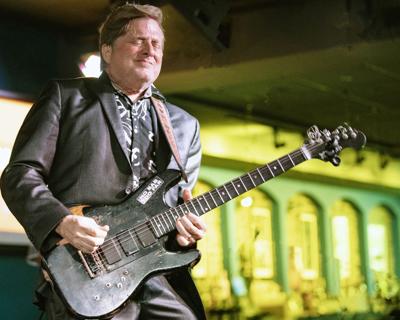
Dave Weld & the Imperial Flames will perform at 6 p.m., Jan. 15 at Bluetick Tavern, 128 W Broadway Ave, Maryville. Picture Courtesy of Karen Murphy
One could say that Dave Weld was literally raised with the blues. Some folks discover it early on by choice, but Weld actually stumbled on it when, as a child, he discovered an old Victrola record player in his basement and a stack of old blues 78 RPM records. He wore out the grooves. Later, when he was in his teens, he became enamored with. the Rolling Stones, Eric Clapton and John Mayall, which eventually led him to discover the true originators of modern blues, such as Howlin’ Wolf, Lightnin’ Hopkins, and B.B. King.
“It was the rebelliousness, but also the groove and how that relates to life,” Weld replied when asked about his enduring commitment to the blues in general. “My first albums were Lightnin’ Hopkins’ Black Cadillac and Howlin’ Wolf’s Big City Blues. I just played them over and over and over.”
His enthusiasm drove him to even further heights as he matured. He moved to New Mexico from Chicago after high school, and began taking guitar lessons under the guidance of Kurt Black, a musician who had performed with Benny Carter, Grant Green and other musicians in New York’s jazz circles. He then drove to Nevada where he met and had an opportunity to jam with blues great Gatemouth Brown.
Eventually, he made back to the fertile musical environs of his hometown Chicago. He had an opportunity to sit in with one of his early idols, Hound Dog Taylor, first at a club called Sweet Peas, and then later, the 1815 Club, which was owned and operated by saxophone player and bandleader Eddie Shaw. It gave him the opportunity to play alongside a number of other blues greats, including Hubert Sumlin, Otis Rush, and Shaw himself.
One could say that Dave Weld was literally raised with the blues. Some folks discover it early on by choice, but Weld actually stumbled on it when, as a child, he discovered an old Victrola record player in his basement and a stack of old blues 78 RPM records. He wore out the grooves. Later, when he was in his teens, he became enamored with. the Rolling Stones, Eric Clapton and John Mayall, which eventually led him to discover the true originators of modern blues, such as Howlin’ Wolf, Lightnin’ Hopkins, and B.B. King.
“It was the rebelliousness, but also the groove and how that relates to life,” Weld replied when asked about his enduring commitment to the blues in general. “My first albums were Lightnin’ Hopkins’ Black Cadillac and Howlin’ Wolf’s Big City Blues. I just played them over and over and over.”
His enthusiasm drove him to even further heights as he matured. He moved to New Mexico from Chicago after high school, and began taking guitar lessons under the guidance of Kurt Black, a musician who had performed with Benny Carter, Grant Green and other musicians in New York’s jazz circles. He then drove to Nevada where he met and had an opportunity to jam with blues great Gatemouth Brown.
Eventually, he made back to the fertile musical environs of his hometown Chicago. He had an opportunity to sit in with one of his early idols, Hound Dog Taylor, first at a club called Sweet Peas, and then later, the 1815 Club, which was owned and operated by saxophone player and bandleader Eddie Shaw. It gave him the opportunity to play alongside a number of other blues greats, including Hubert Sumlin, Otis Rush, and Shaw himself.
Nevertheless, the defining moment in Weld’s career took place in 1976, when, as a writer for Living Blues Magazine, he had the opportunity to meet and interview the legendary blues pioneer J.B. Hutto, a Grammy winning Blues Hall of Fame slide guitarist.
“I could say a lot about J.B., but I will keep it brief,” Weld said. “He taught me everything I needed to know to be a bluesman. J.B. was thrilled when I brought him the magazine with his picture on the cover. I would play second guitar for him so he could practice and keep his chops up for the road. Then he would turn to me and say ’It’s your turn,’ and I would have to play lead. He told me about leading a band, writing songs, and to never give up, no matter who told you that you could not make it — whether it was your parents, your girlfriend, your friends, fellow musicians… anybody. He was stern about that. One of the last things he told me when he was in the hospital dying, was to buy a vehicle for the band. He was in the cancer ward of Cook County Hospital, and I told him I was proud of my new car, a Camaro. He replied, ‘But you did not get something for the band!’ He was a great guy and my hero.”
Hutto also introduced Weld to his nephews, Lil’ Ed and James Young. The three men formed a band, Lil’ Ed and the Blues Imperials and became a regular presence on Chicago’s West Side. They were eventually discovered by Bruce Igauer of the seminal blues label Alligator Records, for whom they recorded and did a series of world tours.
In 1988, Weld formed a band of his own, which he dubbed Dave Weld and the Imperial Flames. The group released their debut album, Rough Rockin in Chicago that same year. They repeatedly toured the world, performed at a number of festivals and made frequent appearances at venues large and small throughout the Midwest. The band has continued to tour ever since, and have produced three critically acclaimed albums along the way.
Their latest, Nightwalk, was released last year.
Weld, who brings his band (lead singer Mona Rose, drummer Jeff Taylor on Drums and Blazing on Bassist Ron Simmons) to Bluetick Tavern on January 15 for the Smoky Mountain Blues Society’s first show of 2023, said it hasn’t always been easy, but the progress they’ve made has been clear. “I often reflect on our course being like ocean waves, because it’s sometimes high and sometimes low,” Weld said. “Even as we get better and more consistent with our shows, I also remember it wasn’t always like that. We used to be on a roll, after an album or a bunch of tours, and then we’d be dead in the water for a while. That was when we were younger, but now there’s always something on the horizon and if not, it’s no big deal because we know it’s on the way. We always put our hearts into the show.”
In that regard, Weld said that he still holds true to the lessons he learned early on.
“J.B. Hutto always taught me to do my own blues, so I wrote a lot,” he said. “However the desire to do the work and the consistent gigs and longevity helps you stand out. What makes us stand out is the quality of our songs, because we put a lot of effort into the different grooves that are still within the Chicago Blues tradition. We were able to do three part harmony, since Monica Myhre and Jeff Taylor are first rate vocalists, and our last album, Nightwalk, was produced by Tom Hambridge, Buddy Guy’s producer. That helped a lot with the sound and it’s the finest work of my career by far.”
Consequently, Weld promised that the upcoming show at Bluetick Tavern will offer an astute example of authentic and original Chicago blues.
“There’s the variety that comes from the three vocalists,” he said. “And Jeff does a few classic soul tunes that everyone knows and that’s a real treat. I will probably walk through the crowd, like J.B. taught me to do. We will play our hearts out!”


